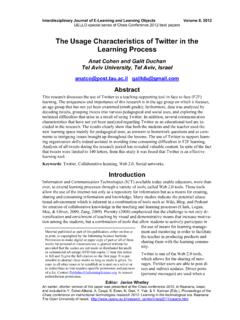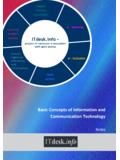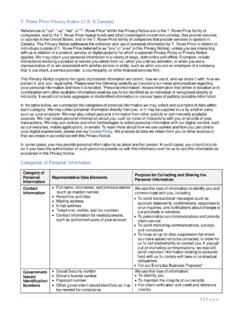Transcription of Exploring the Filipinization of the English Language ... - ed
1 58 Exploring the Filipinization of the English Language in a Digital Age: An Identity Apart from Other World Englishes Orlyn Joyce D. Esquivel Central Luzon State University, the Philippines Abstract Since the colonization of the Americans, Filipinos have been using English as their second Language and have been accustomed to using the Language alongside local languages. The centuries of the extensive contact between American English and Filipino Language raises questions pertaining Language change and Language identity. This paper reports the analysis of 60 selected tweets from twitter individually, with the purpose of highlighting the distinctive features of Philippine English .
2 The tweets were examined for lexical and grammatical features, alongside with the following linguistic features: graphology, syntax, and lexical semantics. The Language Drift Theory was used as a basis to explain the process of Filipinization . In giving light to the discussions, descriptive quantitative-qualitative research was employed. Results revealed the prominent lexical, grammatical, and linguistic features through tables and textual analyses, illustrated from the most to the least dominant linguistic elements. Specified comparative analyses were made to characterize the features of Philippine English as a dialect of International English with graphology, syntax, and lexical semantics as bases for the discussion.
3 The researcher also had a native speaker as a key informant to support the details and provide nativized English translations. Keywords: English as a global Language , world Englishes, Philippine English , Language drift, applied linguistics Introduction Present-day English is a part of the lives of millions of people, and the multiple crucial roles it now fulfills. According to Morrison (2002), with an estimated 350 million native speakers and billion competent speakers, the spread of the English Language around the world over the last few decades has been swift and steady. English has become the lingua franca of our time.
4 It is the international Language of the airlines, the sea and shipping, computer technology, science, and indeed communication generally. In the course of its spread, English has diversified by adapting to local circumstances and cultures, resulting in different varieties of English in every country. English speakers are divided into three groups: native speakers, speakers of English as a second Language , and speakers of English as a foreign Language . Kachru (1994) provided a model to categorize the three concentric circles of World Englishes: Inner circle , Outer circle and Expanding circle (Bauer, 59 2002).
5 In the Inner circle, English is the Language of identity for its native speakers. However, when transferred to countries in the Outer and Expanding circles, English becomes an alien form of expression with different structural properties and a different vocabulary to organize experience (Doms, 2003). Hence, Philippines is one of the largest English -speaking nations that belongs in the Outer circle. Figure 1. Kachru s concentric circles of English (Bauer, 2002, ) Since the colonization of the Americans, Filipinos have been using English as their second Language and have accustomed to using the Language alongside local languages.
6 The phonological, morphological, semantic, and syntactic features of the English Language , throughout the time of Filipinos utilization, had undergone a process that executed a series of changes. These changes generated by the process of Filipinization gave birth to Philippine English (PE), the variety of English native to the Filipinos. According to Florendo (2012), PE is recognizably English except that it is infused with creative vocabulary, syntax, and intonation that only Filipinos can decipher correctly. Kachru (1992), in his book entitled The Other Tongue: English Across Cultures, mentioned that Philippine English has its distinct characteristics , functions, and forms different from the other World Englishes like Singaporean English , Malaysian English , and Thai English .
7 Moreover, its acceptance and legitimacy lie in the fact that English has penetrated the historical, functional, sociocultural as well as the creative processes or contexts 60 of the Filipinos (Kachru, 2004). English is used in official documents of business, government, the legal system, medicine, the sciences, and as a medium of instruction. Textbooks for subjects like calculus, physics, chemistry, and biology are written in English rather than Filipino. Thus, Filipinos assert English with a sort of worldly and cultured standing as compared to the local languages. The use of English attempts to give an air of formality in the Philippines, recognizing its importance as the international Language .
8 The presence of English towards Filipino discourse is also felt in social media. With over 80 percent of Filipinos engaged in social networking sites (Camus, 2017), the usage of social media in the Philippines is evidently high. According to Flores (2014), the influence of social media contributes to the acculturation of English into the Filipinos psyche and culture. Language does influence social status. For the linguist Edward Sapir (1929), Language is not only a vehicle for the expression of thoughts, perceptions, sentiments, and values characteristic of a community; it also represents a fundamental expression of social identity.
9 Being able to utilize English fluently is usually taken as a sign of good education, resulting in a majority of Filipinos interacting in social media using the Language . In the modern-day culture, different social networking sites have been popularized among Filipinos. As of year 2018, twitter has generated an estimated million users in the Philippines (Mateo, 2018). With the act of tweeting , Filipinos can express their thoughts, ideas, and sentiments. As the findings of Mateo (2018) imply that twitter is generating a massive use in the Philippines, the researcher chose it as the initial ground for the study. The extensive contact of American English and Filipino Language for centuries raises questions pertaining to linguistic influence and Language change.
10 Therefore, leading to the importance of studying Philippine English , it simply defines Filipino s own culture, history, and the progress that has taken place in which could be seen in the way the Language is used in the present time. Research Questions The main objective of the study was to explore twitter so as to further expound the features of Philippine English . Thus, to unveil the differences of Philippine English in the context of American English or so-called International English . Specifically, the study sought to answer the following questions: 1. How are the lexical features of Philippine English described with regard to the use of nouns, lexical verbs, adverbs and adjectives?













